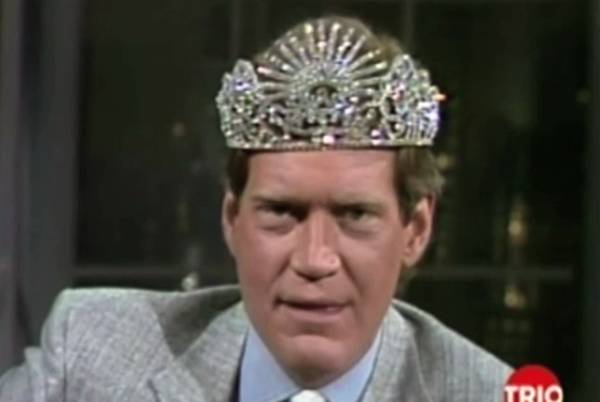the very last activity you would have seen David Letterman doing on
“Late Night” is fawning over baby pictures—as he did during his final
days of public life.
In fact
Letterman was TVs first and now its last grumpy old man, except he was
in his thirties at the time and looking at this video essay, it’s hard
to believe a guy this thorny, someone who spent
this much time torching his bosses and ripping away at a pretentious
celebrity modus operandi—could be on television for more than three
minutes, much less over 30 years.
How does one explain his success?
In interviews
Letterman likes to give all the credit away for his success to his hero,
the great Johnny Carson, and more than occasionally, he even
acknowledges the influence of Steve Allen, the first helmsman of that
NBC institution known as the Tonight Show and perhaps its most talented
performer. (Before anyone insists Jimmy Fallon takes the crown on this
point, take a look at Steve Allen’s “Meeting of Minds,” which he created
and wrote for PBS, and tell me if our latest occupant of Tonight could
pull off something so erudite.)
While
Letterman’s approach to late night TV may have channeled his
predecessors in certain ways—like Letterman, Johnny Carson could
belittle and destroy his guests in a single sentence—the Letterman who
rose to cultural prominence at the end of the Cold War was a singularly
crass, awkward, slightly misogynistic, fearless truth-teller.
And that’s why we loved him.
Letterman’s
eternal brilliance lies in his expansive mastery of the components of
humor: the set-up and the punchline, i.e. the story and the funny
climax.
First, unlike
the 2015 version of himself, Letterman in the 1980s was absolutely not a willing member of America’s celebritocracy—that cult of celebrity
which had always been a large part of show business culture.
But, what
Letterman possessed from the beginning was an uncanny ability to search
for comedic set-ups in visual, verbal and intellectual spaces where no
other performer thought to look. He was intelligent, well read and
lightening fast. Any sentence uttered—stupid or intelligent—on “Late
Night with David Letterman” could be made a slave to his opportunistic,
devastating punchlines—with emphasis on the word “punch.”
And it didn’t
matter who you were—network executives, respected celebrities, stupid
humans, stupid pets and his most prolific target of all, Letterman
himself. No wonder Cher called him an asshole. No one was safe.
Before he
leaves for good, one must acknowledge his huge influence. “Late Night
with David Letterman” taught an entire generation not only how to search
for the perfect comedic set up but also what it means to deliver a
foolproof punchline. In college I watched this sweet anarchy day after
glorious day, as the comedian casually lobbed stick after stick of
verbal dynamite into the key light biosphere, this wanton behavior
continuing unabated for a decade and a half.
But, young
David Letterman was not stupid. He understood himself and his audience
extremely well, and he walked the line between hero and anti-hero,
between TV pioneer and social pariah for as long as he could and as he
aged and matured, he even knew when to step away from that line.
So, here he
is again in full “Dave,” before the anti-depressants, before the lessons
of the sex scandal, before the birth of his son Harry, before his
heroes had ascended to the next life and left him alone.
I was recently waiting in line at the post office.
The lines are
long these days at the busy location in central Plano, Texas because
that branch has staffed down, and one can be sure that sending a parcel
these days is a deeply boring and cynical experience as an impersonal
staff and an uninterested system wastes your time and pisses you off.
A half hour
or so later, I had placed my package in the system, and I was walking
toward the exit. I spied a middle-aged African-American man shaking
his head and sighing in frustration. He was at the end of a very long
line.
I walked up to him and extended a hand which he grasped as if it were a life line.
“The cocktail waitress will be around in a few minutes,” I said to him. “Buy yourself a rum and Coke. I hear they’re amazing.”
The man smiled and laughed.
For those of us who watched it, “Late Night with David Letterman” continues.
Serena Bramble is a film editor whose
montage skills are an end result of accumulated years of movie-watching
and loving. Serena is a graduate from the Teledramatic Arts and
Technology department at Cal State Monterey Bay. In addition to editing,
she also writes on her blog Brief Encounters of the Cinematic Kind.
Ken Cancelosi is the Publisher and Co-Founder of Press Play.


Late Night with David Letterman is some of the best television to ever be broadcast. It was ambrosia for the mind to the teenager i was in the 80s, and is easily responsible for half of whatever personality i have. Dave was a comedy genius, and i miss him.
Fallon is a fraud.
LikeLike
How do you call him "slightly misogynistic" in the subhead, then not give any examples of this? Do you have an editor? If so, that should have been his or her first question
LikeLike